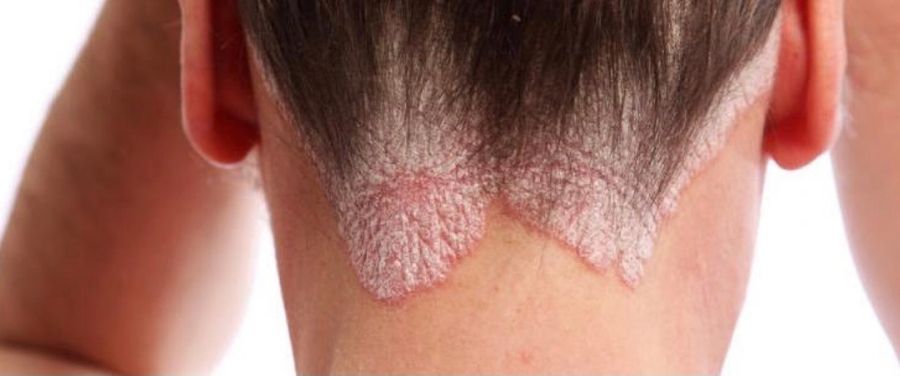What is Psoriasis Disease?
Psoriasis is a skin disorder in which red, scaly rashes appear on the skin. Psoriasis is not an infectious disease else a recurrent disease that can become worse over time.
In psoriasis disease, the life cycle of skin cells increases. In normal condition, the skin cells start growing inside and reach the surface of the skin once a month, but in the state of psoriasis, the cells come on top of the skin within 14 days and are destroyed. The skin affected by psoriasis becomes red and flaky.
What Causes Psoriasis?
Psoriasis disease is characterized by an autoimmune reaction. Disturbance of the immune system of the body is considered to be the cause.
Human skin takes about 28 days to replace old cells and create new cells, but the skin of people with psoriasis produces new cells in just 4 to 5 days. This causes the cells to freeze. This eventually causes red, dry and itchy patches on the skin.
Psoriasis can engulf anyone of any age, but the highest number of cases have been observed in the people aged 15 to 35 and older. The following points can be included behind the development of this skin disease —
- Bacterial or virus infection
- Stress
- Sunburn
- Skin injuries — skin bites, burns, insect bites, and rashes
- Side effects of medicines, including medicines such as anti-malaria
Psoriasis can be more deadly for people whose immune system is weak or who have HIV/AIDS.
Types of Psoriasis
Psoriasis occurs when the skin cells life cycle become fast, resulting in a rapid buildup of dead and rough skin cells. These skin cells assemble, forming dry, red patches and thick silvery scales that are sometimes itchy or painful. In many cases, pus-filled blisters also appear.
Sign and symptoms of psoriasis may vary from person to person and typically identified by their hallmark appearances. They include —
1. Plaque Psoriasis
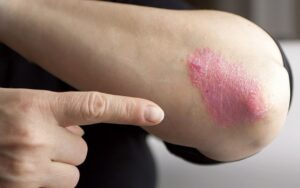
Plaque psoriasis is the most common form of psoriasis. It causes raised, dry and red skin lesions covered with silvery scales. It may be painful and can occur anywhere on the body. You may have few plaques or many. The skin around the joints may crack and bleed.
2. Scalp Psoriasis
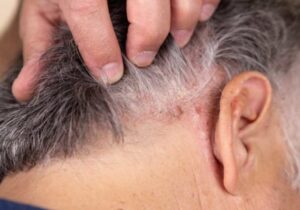
Scalp psoriasis can cause red, itchy skin with silvery-white scales. In children, scalp psoriasis often first appears on the scalp.
Symptoms may include flakes of dead skin in the hair or on the shoulders, especially after scratching the scalp.
3. Nail Psoriasis
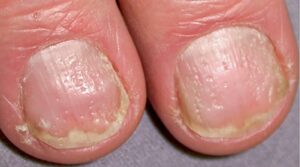
Nail psoriasis can affect your fingernail and toenails. It causes pitting, discoloration and abnormal nail growth. In this type of psoriasis, your nails may become loose and nail may detach from the nail bed (onycholysis).
4. Guttate Psoriasis

Guttate psoriasis is especially associated with strep infection in children (bacterial infection, which causes sore throat and scratches).
In this type of psoriasis, small, red sores mainly on arms, legs and trunk may appear on the skin. The sores aren’t as thick and covered by a fine scale.
5. Inverse Psoriasis
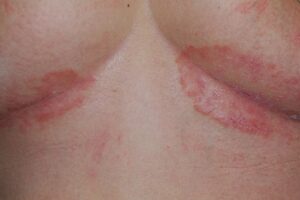
It may cause smooth patches of inflamed and red skin primarily in the groin, armpits, around the genitals and under the breasts. In this, the skin becomes red and irritation also occurs.
6. Pustular Psoriasis
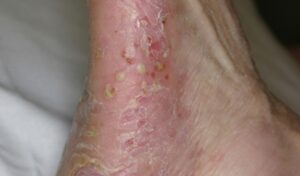
It may occur in widespread patches or in smaller areas on the fingertips, feet or hands. Pustular psoriasis can develop quickly. It can cause pus-filled blisters appearing just few hours after the skin becomes tender and red.
7. Erythrodermic Psoriasis
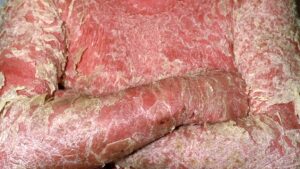
This type of psoriasis is least common.
In this type, the redness on the skin intensifies and covers a large area. Erythrodermic psoriasis can be triggered by corticosteroids, severe sunburn, or another type of psoriasis.
Psoriasis Symptoms
Psoriasis affects your skin. There is a lot of itching on the skin and sometimes the condition can worsen and cause swelling on the skin. Sometimes you can also feel pain. This results in small scaly spots on the skin, dry, cracked skin from which blood can come out.
Many times blisters start forming on the skin. The need for constant itching can be very annoying.
Psoriasis can also affect the joints and cause inflammation in the joints.
Psoriasis Triggers
Common psoriasis triggers may include —
- Stress — stress is a major trigger for some individuals with psoriasis, either causing psoriasis to flare up for the first time or to make it worse after you’ve been diagnosed. [Trusted Source 1]
- Excessive consumption of alcohol
- Smoking and exposure to secondhand smoke — people who smoke have almost double risk of developing psoriasis as compared to the people who’ve never smoked
- Beta-blockers and lithium — beta-blockers to treat high blood pressure or hypertension and lithium for mental disorder can make psoriasis worse [Trusted Source 2] [Trusted Source 3]
- Cold weather — people who have psoriasis and live in a cold climate are at a greater risk of having psoriasis disease
- Infections — skin infections or strep throat
- Certain medications such as high blood pressure medications and antimalarial drugs
- Injuries to the skin — a bug bite, cut or scrape, or a severe sunburn
Risk Factors
If someone has psoriasis disease, then he/she is at a greater risk of developing other conditions; including —
- High blood pressure
- Obesity
- Type-2 diabetes
- Psoriatic arthritis
- Liver disease
- Kidney disease
- High cholesterol
- Cardiovascular disease
- Family history — those people are at greater risk who have the family history of psoriasis
- Mental health conditions — low self-esteem, depression
- Eye conditions — blepharitis, conjunctivitis, uveitis
- Autoimmune diseases — sclerosis, celiac disease, Crohn’s disease
Diagnosis
Your doctor or health care provider will ask questions about your health and will examine your body; including skin, scalp and nails.
Your doctor might take a small tissue from your skin in order to examine it under a microscope. This process is known as biopsy. This will help your doctor to determine the type of psoriasis.
Psoriasis Prevention
There is no way to prevent psoriasis disease, but some things may improve the symptoms. [Trusted Source 4]
Some ways to reduce the risk of a psoriasis flare-up include —
- Take daily baths
- Avoid triggers if you can
- Keep your skin moisturized
- Get a small amount of sunlight each day
Psoriasis Treatments
Psoriasis treatments may include —
- Topical therapy
- Light therapy
- Oral or injected medication
Topical Therapy
In this type of treatment, creams and ointments are applied directly to the skin to reduce symptoms. It includes —
Topical Corticosteroids :
Corticosteroids are the medications used to treat mild to moderate psoriasis. They are available as cream, lotions, gels, ointments, sprays, foams and shampoos.
It is usually recommended to apply at sensitive areas.
Vitamin D Analogues :
This type of medication may be used alone or along with topical corticosteroids. These are the synthetic forms of vitamin D. Examples may include calcitriol and calcipotriene. They work by slowing down the growth of skin cells.
Calcitriol and calcipotriene are usually more expensive than those of topical corticosteroids.
Retinoids :
Retinoids are the medication used to regulate the epithelial cell growth. Examples may include tazarotene.
Tazarotene medication is available in the form of gel and cream. You can apply it once or twice daily.
It is not advisable to use tazarotene if you’re pregnant or planning to get pregnant. Do not use this medicine if you are breast-feeding.
Calcineurin Inhibitors :
Calcineurin inhibitors are used to treat various inflammatory skin diseases, especially — atopic dermatitis and psoriasis. Examples are — tacrolimus and pimecrolimus.
They reduce inflammation and plaque buildup and especially helpful in areas of thin skin, such as around the eyes.
It is not advisable to use calcineurin inhibitors if you’re pregnant or planning to get pregnant. Do not use this medicine if you are breast-feeding.
Anthralin :
Anthralin is a cream used to slow down skin cell growth. It can also used to remove scales and make skin smoother.
It is recommended not to use this on your face or genitals. Anthralin can make skin irritation (usually applied for a short of time).
Salicylic Acid :
Salicylic acid is a beta-hydroxy acid. It is normally used to reduce acne by exfoliating your skin and keeping pores clear.
Coal Tar :
It is used to reduce inflammation, scaling and itching. It is available in various forms; such as oil, shampoo and creams. These products can irritate the skin.
This treatment is not recommended for women who are breast-feeding or pregnant.
Light Therapy
This therapy is used to treat moderate to severe psoriasis, either alone or with other medications. It involves artificial or natural light to treat psoriasis. Sunlight eradicates those hyperactive white blood cells which are attacking healthy skin cells and are rapidly generating cells.
Both UVA and UVB light may be useful in reducing the symptoms of mild to moderate psoriasis. Most people with moderate to severe psoriasis benefit from a combination of treatments.
Oral or Injected Medication
If someone with moderate to severe psoriasis don’t get relief from other treatments, then his/her doctor may prescribe oral or injected medications.
Some of the medications used are —
- Steroids— If you have psoriasis symptoms such as small and persistent patches, your doctor or health care provider might suggest triamcinolone injection right into the lesions.
- Biologics— This class of drugs changes your immune system. These drugs are given intravenously via injection.
- Cyclosporine— This drug blocks the immune system response, which can reduce the symptoms of psoriasis. This means that if your immune system is weak, you can get sick easily. Side effects include kidney problems and high blood pressure. These drugs are not recommended if you’re pregnant, planning to get pregnant or breast-feeding.
- Methotrexate— Like cyclosporine, this drug exerts pressure on the immune system. It may have fewer side effects when used in low doses, but in the long term it can cause serious side effects. This includes liver damage, reduced production of white and red blood cells.
- Retinoids— These drugs are used to reduce skin cell production. Once you stop using them, there are likely to be symptoms of psoriasis. Pregnant women or women who become pregnant within the next three years should not use retinoid because of the risk of possible birth defects.
Home Remedies for Psoriasis
Apart from medical treatments, psoriasis disease can also be treated by home remedies naturally. It may include —
1. Apple Vinegar :
Material Required :
- 1/4 Cup of apple vinegar
- 3/4 Cup of lukewarm water
- Cotton balls
How to Use :
- Mix vinegar properly in the water
- Soak cotton balls in vinegar with lukewarm water and squeeze lightly on the affected skin
- Keep it on the affected area for about 1 to 2 minutes and then remove
- Repeat this process 4 to 5 times a day to get rid of itching and burning sensation
Benefits :
Apple vinegar can be a good home remedy to treat psoriasis. Sometimes this skin disease can be caused by bacteria, virus infection, cuts and burns. Apple vinegar is rich in anti-allergic, antiviral, anti-fungal, antimicrobial and anti-inflammatory properties. [Trusted Source 5] [Trusted Source 6]
Together these properties can help to remove burning, itching and rashes from the skin affected by psoriasis.
2. Aloe Vera :
Material Required :
- Aloe-vera leaf
How to Use :
- Clean aloe vera leafs with normal water and keep it in the fridge to cool for a while
- Now remove the top layer of aloe vera leaf with the help of a knife and store the gel in a small bowl
- Apply this gel on the affected skin
- Leave it for 20 to 25 minutes
- Clean the skin with normal water
- You can do this remedy twice a day
Benefits :
Successful treatment of psoriasis disease can be done through aloe-vera. You can apply aloe-vera gel on the affected skin. It is a natural medicine, which works to calm the irritation of skin with its coolness. It also has anti-inflammatory and antibacterial properties, which help in relieving inflammation and bacterial infection. [Trusted Source 7]
It contains a special enzyme called bradykinase, which works to correct the highly inflammatory skin conditions. [Trusted Source 8]
3. Green Tea :
Material Required :
- A green tea bag
- A cup of hot water
How to Use :
- Put the green tea bag in hot water for about five minutes
- Remove the tea bag and drink tea
- Drink two to three cups of green tea a day
Benefits :
Green tea is known for its antioxidant properties. [Trusted Source 9]
Therefore, it may play a supporting role in dealing with the symptoms of the psoriasis disease. It works by flushing out toxins from the body, which can cause itching and irritation.
4. Turmeric :
Material Required :
- Two teaspoons turmeric
- 1/4 cup of water
How to Use :
- Add turmeric to the water in a bowl and make a thick paste by heating it
- Allow this paste to get cool
- Apply it on the affected area. Store the remaining paste in the fridge or refrigerator
- Leave the paste on the skin until it dries and then clean the skin later
- You can apply turmeric paste twice a day
Benefits :
Turmeric is an Ayurvedic medicine, enriched with antibacterial, anti-inflammatory, antioxidant properties. It can heal wounds quickly. [Trusted Source 10]
You can use it to eliminate itching, burning, bacteria and fungal of the skin affected by psoriasis.
5. Ginger :
Material Required :
- Ginger oil
- Olive oil
How to Use :
- Take a few drops of ginger oil and apply it on the affected area
- If your skin is sensitive, you can mix olive oil with ginger oil
- Apply it twice a day
Benefits :
Ginger oil is rich in antimicrobial properties, which may play a supporting role in the treatment of psoriasis disease. [Trusted Source 11] [Trusted Source 12]
6. Coconut Oil :
Material Required :
- Coconut oil
How to Use :
- Take a few drops of coconut oil and leave it on the affected skin
- Repeat this process two to three times a day
Benefits :
Coconut oil is considered good for the skin. It is rich in moisturizing properties, which works to relax the scaly and itchy skin.
You can use coconut oil to eliminate the symptoms of psoriasis. In addition, this oil is effective antiseptic, which will help to reduce psoriasis infection. [Trusted Source 13]
7. Dead Sea Salt / Rock Salt :
Material :
- One cup dead sea salt / rock salt
- Bath water
- A bathtub
How to Use :
- Pour hot bath water in the bathtub and add salt to it
- Take a bath in this water for about 15 to 20 minutes
Benefits :
Dead sea salt is rich in minerals such as sodium and magnesium. It works effectively on inflamed and itchy skin. In addition to this, it also acts to hydrate the skin. [Trusted Source 14]
You can also use rock salt instead of dead sea salt. Rock salt is also rich in magnesium, which can help you in relieving the symptoms of this skin disease. [Trusted Source 15]
8. Tea Tree Oil
Material Required :
- 3 to 4 drops of tea tree oil
- 1 Tablespoon of olive oil
How to Use:
- Add olive oil to the tea tree oil
- Now apply this mixed oil on the affected skin
- You can apply this oil two to three times a day
Benefits :
Tea tree oil is a special oil, which acts as an anti-psoriasis. It helps in getting rid of skin diseases soon. It is also rich in anti-inflammatory properties, which will help in quick relief from inflammation and irritation. [Trusted Source 16]
But before using tea tree oil, do a patch test.
9. Olive Oil :
Material Required :
- Extra virgin olive oil
How to Use :
- Take a few drops of olive oil and apply it on the affected skin
- Do this remedy 3 to 4 times a day
Benefits :
Olive oil can be an effective home remedy for psoriasis. This oil is enriched with anti-inflammatory and antioxidant properties, which act to heal wounds quickly and relieve skin irritations. [Trusted Source 17]
10. Linseed Oil :
Material Required :
- A little linseed oil
How to Use :
- Apply a few drops of oil to the affected area and leave it for a while
- Use this oil 3 to 4 times a day
Benefits :
You can use linseed oil as a medicine for psoriasis. Linseed oil is a rich source of antioxidants such as alpha-linolenic acid, omega-3 fatty acids, tocopherols and beta-carotene.
It keeps the pH of the skin balanced and hydrated. This oil may be helpful in calming the symptoms of skin affected by psoriasis. [Trusted Source 18] [Trusted Source 19]
11. Neem Oil :
Material Required :
- Neem oil
How to Use :
- Apply a few drops of neem oil on the affected area by putting it on the fingers
- Apply oil twice a day
Benefits :
You can use neem oil as a medicine for psoriasis. Neem oil can be most effective for the skin. It is enriched with anti-bacterial and anti-fungal properties, which will serve to quickly remove bacterial infections of the skin. [Trusted Source 20]
12. Fish Oil :
Material Required :
- Fish oil capsule
How to Use :
- Remove the oil from the fish oil capsule and apply directly on the affected skin
- You can use this remedy 2 to 3 times a day
Benefits :
Fish oil is rich in omega-3 and omega-6 fatty acids, which have anti-inflammatory effects on the skin. You can use fish oil to relieve the symptoms of psoriasis such as burning and swelling.
13. Baking Soda :
Material Required :
- 1/2 Cup baking soda
- Bath water
- A bathtub
How to Use :
- Fill the bathtub with water and add baking soda to it
- Now immerse the body in this water for 10 to 15 minutes
- Take a bath with baking soda water for at least 3 times per week
Benefits :
You can use baking soda to treat psoriasis. It is enriched with anti-fungal and anti-bacterial properties, which will serve to relax the skin affected by psoriasis disease. [Trusted Source 21] [Trusted Source 22]
14. Oatmeal Bath :
Material Required :
- Half cup of oatmeal
- Bath water
- A bathtub
How to Use :
- Fill the bathtub with warm bath water and add colloidal oatmeal to it (If you do not get colloidal oatmeal, you can grind and use whole oatmeal)
- Take a bath for about 15 to 20 minutes
- Repeat this remedy daily
Benefits :
Oatmeal is rich in anti-inflammatory and moisturizing properties, which can work to relax the skin infected with psoriasis. [Trusted Source 23]
Juice for Psoriasis Disease
a) Carrot :
Material Required :
- Three to four carrots
- One Apple
- Spinach leaves (as required)
- Water
How to Use :
- Blend the carrots and spinach well with some water
- Now drink this mixture
- You can drink carrot juice once daily
Benefits :
In psoriasis, you can consume carrots as a diet. Carrots are rich in antioxidants such as beta-carotene, which may help you to relieve the symptoms of psoriasis. [Trusted Source 24]
b) Lemon Juice :
Material Required :
- A spoonful of lemon juice
- A glass of water
How to Use :
- Add lemon juice to the water and drink it 20 minutes before breakfast, noon and dinner
- You can also apply lemon juice on the affected area for 10 minutes. After this wash the skin with lukewarm water
- Drink lemon juice daily for three to four weeks
Benefits :
Lemon comes with antibacterial, antiviral, and anti-fungal properties, which can help to relieve the symptoms of psoriasis such as pain, swelling, and itching. [Trusted Source 25]
c) Wheatgrass :
Material Required :
- 1/2 Cup of wheatgrass
- 2-3 Cups of water
- A spoonful of lemon juice
How to Use :
- Cut the wheatgrass with a knife and blend it with water in a blender
- Now filter it in a glass and drink it mixed with lemon juice
- Drink on an empty stomach every morning
Benefits :
To avoid skin diseases like psoriasis, you can consume wheatgrass juice. Wheatgrass is rich in flavonoids, vitamins C and vitamin E, which can act to calm the symptoms of psoriasis. [Trusted Source 26] [Trusted Source 27] [Trusted Source 28]
d) Bitter Gourd Juice :
Material Required :
- 1/4 Cup of bitter gourd juice
- 1/2 Cup of water
- 1/4 Teaspoon of lemon juice
- 1/4 Teaspoon of honey
How to Use :
- Mix bitter gourd juice, lemon juice and honey in water
- Drink this mixture on an empty stomach in every morning
- You can use this remedy daily for a few months
Benefits :
Bitter gourd juice is a natural medicine, which cleanses the blood by removing toxins from the body. It is enriched with antibacterial and antioxidant properties, which protect your body from bacterial infection and heal wound quickly. [Trusted Source 29]
15. Coconut Water :
Material Required :
How to Use :
- Drink one glass of coconut water daily
- It can be consumed regularly for a few months to treat psoriasis disease
Benefits :
Coconut water intake is the most effective natural way of hydrating your body, which has a positive effect on your skin. [Trusted Source 30]
Apart from this, coconut water also strengthens the digestive and immune system, which helps your body to absorb nutrients.
16. Buttermilk :
Material Required :
- Fresh buttermilk
- Cotton balls
How to Use :
- Soak cotton ball in buttermilk and apply it on the affected areas and leave it for some time
- You can also drink a glass of buttermilk daily
Benefits :
Buttermilk is a milk product and these milk products are rich in anti-inflammatory properties. [Trusted Source 31]
You can use it to soothe the burning and inflammatory symptoms of psoriasis.
17. Vitamin-D and Vitamin-E
You can include vitamin-D in your diet for psoriasis treatment. It is a special nutrient that protects your skin from harmful ultraviolet rays of the sun. [Trusted Source 32]
Apart from this, vitamin-E is also considered beneficial for the skin. It is an antioxidant, which works to eliminate free radicals and protects from harmful rays. [Trusted Source 33]
Additional Tips
Apart from psoriasis remedies, you should also follow these tips —
- Avoid sun exposure. Use an umbrella whenever you are out in the hot sun
- Get treatment if you see any type of wound or infection on the skin
- Take bath daily and keep the skin clean
- Do not scratch the skin when itchy, this can make the problem serious
- In case of symptoms of psoriasis, do medical treatment or prescribed home remedies
Diet for Psoriasis
A person suffering from psoriasis should include foods which are rich in anti-bacterial, anti-inflammatory properties and in vitamin C, vitamin E and vitamin D.
Consume green vegetables and fruits as much as possible. To keep the body hydrated, drink coconut and fruit juice.
Conclusion
Psoriasis is a serious skin disorder apart from common skin itching, which can also cause diseases such as diabetes and arthritis. Therefore, follow the remedies immediately after seeing the symptoms of psoriasis mentioned in the article and see a dermatologist for precaution.
Hope you liked this article, you can share your suggestions and experiences related to skin diseases in the comment box below.
